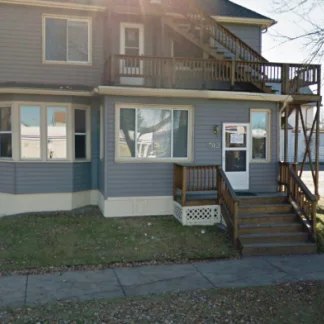St. Luke's Mental Health - Laurentian Medical Clinic
St. Luke's Mental Health - Laurentian Medical Clinic offers an outpatient treatm...
Twelfth Step House is a drug and alcohol rehab and transitional living facility for men located in Virginia, Minnesota. They provide counseling, peer support, support meetings, and recreational activities.
Addiction-related services available are group and individual counseling, recovery housing, and addiction recovery meetings and support.
Sober living This sober living home is a transitional setting where structure, recovery meetings, counseling, and support and guide the residents.
Peer support Living with other individuals who are starting out in recovery allows you to exchange experiences, share goals, and find support within the community.
Recovery meetings In this sober living setting, 12 step meetings are offered daily inside the facility and outside in the community. Attending these meetings and following the 12 steps is a pillar of this addiction treatment plan.
Contact us for more information: (218) 749-4328

Connect with Twelfth Step House by calling their admissions team directly.
(218) 749-4328 Website Get DirectionsGroup therapy is any therapeutic work that happens in a group (not one-on-one). There are a number of different group therapy modalities, including support groups, experiential therapy, psycho-education, and more. Group therapy involves treatment as well as processing interaction between group members.
In individual therapy, a patient meets one-on-one with a trained psychologist or counselor. Therapy is a pivotal part of effective substance abuse treatment, as it often covers root causes of addiction, including challenges faced by the patient in their social, family, and work/school life.
Life skills trainings involve all the skills a person must have in order to function successfully in the world. These include time management, career guidance, money management, and effective communication. Truly successful addiction recovery is based on the ability to not only live substance-free, but to thrive. Life skills teaches the practical necessities of functioning in society, which sets clients up for success in life, and therefore sobriety.
Recreational therapy (aka therapeutic recreation) uses creative and fun activities to help with addiction recovery. Recreational therapists lead patients in entertaining and engaging activities like sports or games; art (drawing, painting, sculpture); drama, music, and dance; and/or community outings (field trips) to improve patients' physical, social, and emotional well-being.
In individual therapy, a patient meets one-on-one with a trained psychologist or counselor. Therapy is a pivotal part of effective substance abuse treatment, as it often covers root causes of addiction, including challenges faced by the patient in their social, family, and work/school life.
Life skills trainings involve all the skills a person must have in order to function successfully in the world. These include time management, career guidance, money management, and effective communication. Truly successful addiction recovery is based on the ability to not only live substance-free, but to thrive. Life skills teaches the practical necessities of functioning in society, which sets clients up for success in life, and therefore sobriety.
Recreational therapy (aka therapeutic recreation) uses creative and fun activities to help with addiction recovery. Recreational therapists lead patients in entertaining and engaging activities like sports or games; art (drawing, painting, sculpture); drama, music, and dance; and/or community outings (field trips) to improve patients' physical, social, and emotional well-being.
Life skills trainings involve all the skills a person must have in order to function successfully in the world. These include time management, career guidance, money management, and effective communication. Truly successful addiction recovery is based on the ability to not only live substance-free, but to thrive. Life skills teaches the practical necessities of functioning in society, which sets clients up for success in life, and therefore sobriety.
Recreational therapy (aka therapeutic recreation) uses creative and fun activities to help with addiction recovery. Recreational therapists lead patients in entertaining and engaging activities like sports or games; art (drawing, painting, sculpture); drama, music, and dance; and/or community outings (field trips) to improve patients' physical, social, and emotional well-being.
Recreational therapy (aka therapeutic recreation) uses creative and fun activities to help with addiction recovery. Recreational therapists lead patients in entertaining and engaging activities like sports or games; art (drawing, painting, sculpture); drama, music, and dance; and/or community outings (field trips) to improve patients' physical, social, and emotional well-being.
St. Luke's Mental Health - Laurentian Medical Clinic offers an outpatient treatm...
Lotus Transitional Services is a private rehab located in Saint Joseph, Missouri...
Range Mental Health Center is a private rehab located in Virginia, Minnesota. Ra...
Arrowhead Center is a non-profit rehab located in Virginia, Minnesota. Arrowhead...